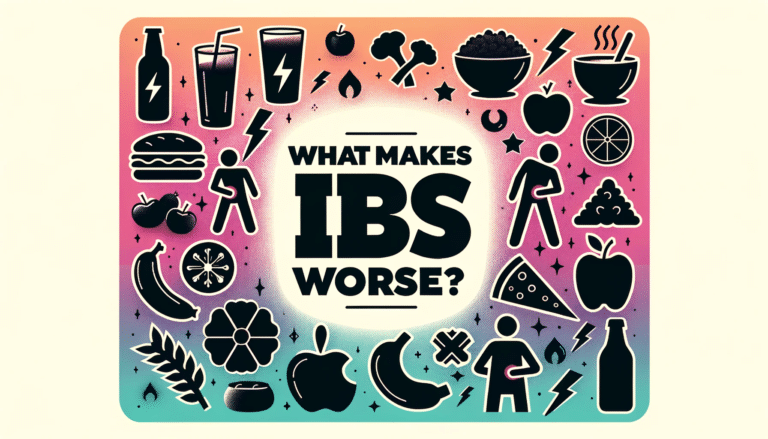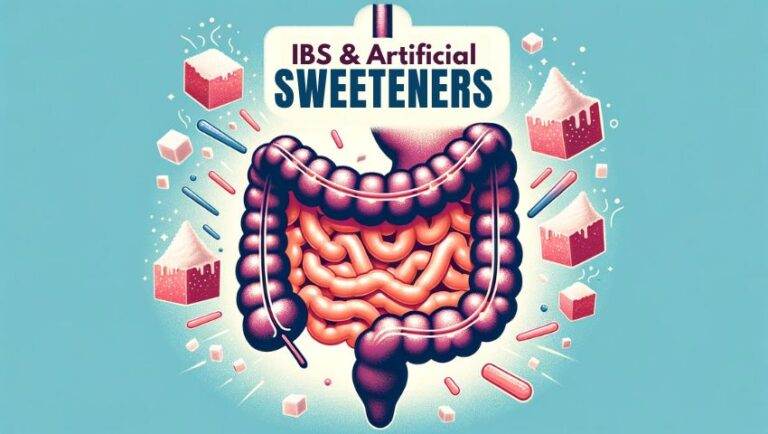Why Is IBS So Common? – Exploring the Surprising Prevalence and Impact

IBS affects between 25 and 45 million Americans – negatively impacting their daily lives. But the question remains – why is IBS so common?
New research indicates it’s our modern lifestyle to blame. From constant stress to overly processed foods, our current way of living promotes gastrointestinal issues.
Read on to learn why experts believe IBS is on the rise and what we can do to reverse the trend.
Key Takeaways
- IBS is a chronic gastrointestinal disorder that affects 5-10% of the global population [1].
- The prevalence of IBS varies across different regions, with South America having the highest prevalence rate of 21% [2].
- Genetic factors, including gene variants associated with serotonin regulation, play a significant role in the onset of IBS.
- Diet, lifestyle choices, and mental health, including exercise, probiotics, and managing emotional triggers, are important in managing IBS.
Understanding IBS: The Basic Facts
Let’s delve into the world of IBS, starting with some intriguing facts that shed light on its common occurrence.
IBS, or Irritable Bowel Syndrome, is a chronic gastrointestinal disorder affecting 10-15% of the global population. Its elusive nature makes it challenging to pinpoint a single cause.
Symptoms of IBS, including abdominal pain, bloating, constipation, and diarrhea, can vary in intensity.
Triggers encompass diverse factors like certain foods, stress, hormonal changes, or gut bacteria imbalance.
Diagnosing IBS is no easy task, as there’s no definitive test. Doctors rely on ruling out other conditions and analyzing symptom patterns.
Understanding these factors is key to effectively managing IBS and finding relief from its bothersome symptoms.
The Global Scope of IBS: Prevalence Rates
You’re likely to find it fascinating how widespread this condition truly is on a global scale.
IBS in children, for example, is a growing concern. The global healthcare disparities further complicate this issue.
| Region | IBS Prevalence (%) |
|---|---|
| North America | 7-10 |
| South America | 21 |
| Europe | 10-20 |
| Asia | 5-10 |
| Africa | 3-10 |
These figures really highlight how widespread IBS is, but they also suggest that there are differences between regions.
The high prevalence rate in South America could be due to cultural and dietary factors specific to that region.
However, it’s also possible that the unequal distribution of healthcare resources plays a role, resulting in inadequate management of the condition.
So, even though IBS is a common condition worldwide, its impact is shaped by various socio-economic factors.
The Role of Genetics in IBS
Genetics plays a significant role in this widespread condition.
Recent advancements in genetic testing have improved efficiency and accuracy, allowing researchers to identify multiple gene variants associated with IBS, such as GNβ3 and SLC6A4.
These genes regulate serotonin, a neurotransmitter crucial for gut function.
Twin studies have further emphasized the importance of genetics. Identical twins show a higher concordance rate for IBS compared to fraternal twins, indicating a strong genetic component.
Despite environmental factors, the likelihood of both identical twins having IBS is greater.
Clearly, genetics plays a vital role in the onset of IBS, acting as a key factor in its development.
Diet and Lifestyle: Their Impact on IBS
Genetics may have a role, but we mustn’t overlook the impact of diet and lifestyle on our digestive health.
Research from various studies reveals that exercise and probiotics can make a remarkable difference in managing the symptoms of IBS.
Engaging in regular physical activity has been found to reduce inflammation and improve gut motility, leading to relief from common IBS issues like bloating and constipation.
Similarly, incorporating probiotics into your routine, either through foods like yogurt or supplements, can effectively restore balance to the gut bacteria, which tends to be disrupted in individuals with IBS.
It’s crystal clear that adopting a lifestyle that includes exercise and probiotics can play a significant role in managing IBS symptoms.
Nurturing a healthy digestive system can therefore be highly attributed to making healthy diet and lifestyle choices.
Stress and Mental Health Connections to IBS
Overlooking the role stress and mental health play in your digestive health is one mistake you shouldn’t make.
Studies show that emotional triggers can disrupt the gut-brain axis, potentially worsening IBS symptoms considerably.
On that note, it’s worth mentioning that psychosocial interventions have proven effective in managing these triggers and improving digestive health.
Consider these factors:
| Emotional Triggers | Impact on IBS | Interventions |
|---|---|---|
| Stress | Increase in symptom severity | Cognitive-Behavioral Therapy |
| Anxiety | Higher risk of flare-ups | Relaxation Techniques |
| Depression | Chronic IBS | Antidepressants |
These findings highlight the interplay between your mind and gut. It’s not just about what you eat or how active you are.
Your mental well-being is a critical component in managing IBS. So, don’t underestimate the power of holistic approaches in your treatment plan.
Gender Differences in IBS Occurrence
You know what’s interesting? There’s actually a pretty big difference between men and women when it comes to dealing with digestive problems.
Take IBS, for example. It’s way more common in women. One of the reasons for this is the influence of hormones.
During their menstrual cycle, women experience hormonal changes that can make IBS symptoms worse.
And get this – the levels of estrogen and progesterone in their bodies can also mess with their gut, making it more sensitive and affecting how it moves.
Now here’s something else to think about: age. Research has shown that women under 50 are more likely to develop IBS compared to men.
But here’s the kicker – once they hit the big 5-0, that gender gap starts to even out. This is probably because of the changes in hormone levels after menopause.
Knowing all this stuff can really help when it comes to figuring out the best ways to treat IBS.
By understanding these factors, doctors can come up with strategies that target the specific needs of women who are dealing with digestive disorders.
IBS Diagnosis: The Process and Challenges
Getting a diagnosis for your persistent stomach troubles isn’t always straightforward; it’s a process that can be fraught with challenges.
Symptom variability and diagnostic misinterpretations are common hurdles. It’s crucial to understand the factors that may contribute to these diagnostic challenges:
| Factors | Impact on Diagnosis | Solution |
|---|---|---|
| Symptom Variability | May lead to incorrect diagnosis | Detailed symptom tracking |
| Diagnostic Misinterpretations | Can result in mistreatment | Second opinion or specialist consultation |
| Lack of Objective Tests | Reliance on symptom-based diagnosis | Research for new diagnostic methods |
| Overlapping Symptoms with Other Conditions | Risk of misdiagnosis | Comprehensive medical evaluation |
| Patient-Doctor Communication Gap | Misunderstanding of symptoms | Clear, open conversation |
Current Treatments and Managing IBS
Dealing with IBS can make you feel like you’re on an endless rollercoaster of symptoms. But there are more treatment options available now than ever, which is promising.
New prescription meds like linaclotide and lubiprostone help regulate gut fluid secretion and can provide relief from diarrhea, constipation, and pain.
Anti-spasmodics are great for easing abdominal cramping and irregular bowel habits too.
Natural remedies like probiotics and gut-directed hypnotherapy with Nerva also have proven benefits for managing IBS.
Clinical trials show probiotics can reduce or improve symptoms by around 21%. And studies find hypnotherapy is around 75% effective for many IBS patients.
The key is finding the right balance of conventional and alternative therapies tailored to you.
With open communication with your doctor and some trial and error, you can develop an effective IBS treatment plan.
Relief may take time, but more options exist today than ever before to get your gut issues under control.
The Future of IBS Research: What’s Next?
Promising advancements are being made in research on potential treatments for troublesome digestive disorders like IBS.
And here are some key advancements bringing hope for future treatments of digestive disorders:
- Revolutionary DNA sequencing unlocks understanding of the influential gut microbiome. This enables tailoring of treatments based on an individual’s unique microbiome profile.
- Development of novel pharmaceuticals precisely targeting specific gut bacteria implicated in digestive diseases. Smart drug design based on microbiome insight [3].
- Cutting-edge smart pill technology allows real-time monitoring of the gut’s environment and how it changes with interventions. A feedback loop for optimizing highly personalized treatments [4].
While challenges remain, these technologies accelerate progress toward precise, microbiome-based therapies for troublesome digestive disorders.
Each innovation provides more dots to connect on the roadmap toward transformative solutions.
Patience and persistence in research may yet yield transformative treatments.
Why Is IBS So Common? – Concluding Thoughts
IBS is a real buzzword these days, popping up left and right.
It’s no wonder, considering our jam-packed schedules, questionable food choices, and good ol’ genes all have a part to play. But there’s more to the story.
The gut-brain connection, you see, adds a twist to the tale, making things even trickier.
By wrapping our heads around these factors, we can tackle this widespread issue head-on.
So let’s get cracking and show IBS who’s boss!
Disclaimer: This content is based on my personal experience as an individual diagnosed with celiac disease and IBS (Irritable Bowel Syndrome) who follows a strict gluten-free diet. This does not constitute medical advice. Please consult a medical professional, nutritionist, or qualified dietitian for personalized, professional advice.






